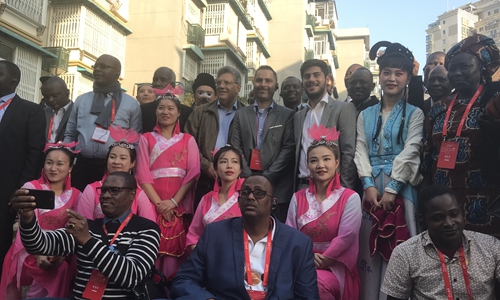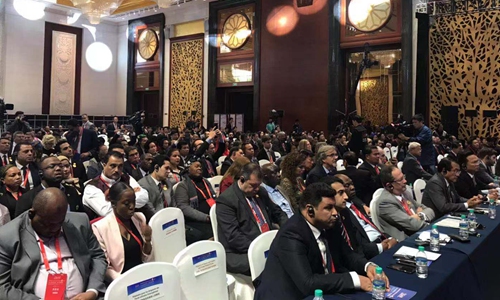HOME >> CHINA
International delegates in Jiangxi see China’s social reforms up close
By Zhang Han Source:Global Times Published: 2019/11/26 20:08:40

Delegates from northern African countries and Cyprus pose for a group photo with opera performers from a community in East China's Jiangxi Province. Photo: Zhang Han/GT
Some 350 political party delegates from more than 60 countries visited East China's Jiangxi Province, where they see close on how China implemented its policies of poverty reduction, environmental protection and other goals of improving people's livelihood.During their week-long tour upon the invitation of the International Department of the Central Committee of the Communist Party of China (CPC) and CPC Jiangxi Provincial Committee, delegates were amazed to learn that the province, an old revolutionary base area, reduced its poverty rate from about 10 percent in 2013 to 1.38 percent in 2019, representing a part of the 80 million Chinese lifted out of poverty in the last six years.
Besides raw numbers, the delegates were informed about how the region developed forestry, the porcelain industry and a virtual reality center to boost the economy. They listened to Jiangxi residents sharing their stories about striving for a better life, and visited communities and companies to vividly experience how the region showcases China's multifaceted development.
The international delegates commented on how the achievements in Jiangxi demonstrate the effectiveness and success of CPC's governance system after they attended two briefing sessions held in Nanchang on Wednesday and Thursday, one about the fourth plenary session of the 19th CPC Central Committee and the other themed "Working for the happiness of the people: mission of political parties."
Halel Halel, deputy general secretary of the Baath Arab Socialist Party of Syria, noted that "CPC's experiences were not copied from other countries, but came from China's own practice and innovation."
Luis Quevedo, a delegate from Colombia, told the Global Times he was surprised to hear a keynote speaker emphasize that no country should copy China's path but rather explore their own development pattern based on their own situations.
"China neither imposes its development pattern onto other countries, nor says its governance system is a perfect one," Quevedo said, noting such an inclusive and progressive view gives people motivation for a better future.
Amirah Sumarto, a delegate from Indonesia, said China's governance system and progress in economic growth, technology and curbing corruption can be an inspiration for her country, which is similarly populous and diverse, and faces related challenges.
"If China can, we can too as long as we can find our own way by looking back into history and digging deeper into our culture," she told the Global Times.

Two Cypriot delegates experience a virtual reality (VR) ride at a VR amusement park in Nanchang in Jiangxi. Photo: Zhang Han/GT
People-centered strategyDelegates of world political parties were impressed that CPC grassroots officials are so close to common people and can mobilize them to achieve collective goals such as alleviating poverty in a village, protecting a river or upgrading an old community.
Deng Daqing, an orange planter, shared his story of how officials helped him pay his medical debt via social insurance, apply for agricultural loans and introduced technology inspectors to help him cast off poverty.
Deng, now a CPC member, sells his fruits through WeChat and other e-commerce platforms. He also started an orange association for planters in his village to share information and promote indigenous products.
Some 3 million Chinese officials from governments above the county level have stayed in impoverished villages to help residents cast off poverty, and more than 770 had sacrificed their lives in doing so.
Another policy innovation by CPC is river chief, which could be more important in Jiangxi than in other places as the province has 3,700 rivers of different sizes.
Zhong Huaguo, Party chief of a township in Jiangxi, serves as a river chief. He is in charge of the prevention of illegal discharging, crackdown of illegal sand mining, ecological protection and regulation of aquaculture.
The river chief policy aims to tackle the environmental problems that used to be shelved. The policy is especially needed in the context of trans-department and trans-regional coordination.
Sumarto, the Indonesia delegate, after visiting a housing upgrade project in Nanchang, told the Global Times that "statistics I learnt from reports and the briefing sessions become true things in front of my eyes."

Delegates of world political parties attend a meeting about the poverty alleviation and other governance experience of Communist Party of China in Nanchang, East China's Jiangxi Province. Photo: Zhang Han/GT
The Indonesian delegate said it was fresh for her to learn about how residents' committee members, many of whom are also CPC members, held consultations and solicited opinions of residents.
What is the key to CPC's governance system that might be a useful tip for other political parties? Chinese analysts underlined the principle of "from the people, of the people, for the people."
The CPC comes from and represents the people, depends on the people in governance and works for the people's welfare, Su Changhe, a professor with the School of International Relations and Public Affairs in Fudan University in Shanghai, explained.
Newspaper headline: Understanding the CPC
Posted in: IN-DEPTH